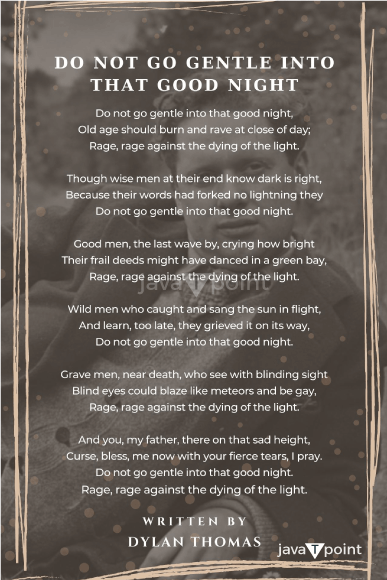Do Not Go Gentle into That Good Night Summary
The Poet Dylan Thomas was a famous poet who wrote "Do Not Go Gentle into That Good Night" in 1951. These words are written by a son dedicated to his father at the time father's death. Death and its timing are unpreventable, and humans can't predict them. In his life poet, himself was gone too soon and has expressed and explored the tension of dying in the poem. It is one of the famous poems of the Poet Dylan Thomas, studied in schools and universities worldwide. Poet cleverly uses figurative language, refreshing and inventive use of poetic form, and a poignant message about life and death. This poem was written five years after its publication, but most assume he wrote it for his terminally ill father (who died in late 1952). Instead, Thomas's life ended in November 1953. About Poem
The poem is made of five stanzas, three lines each, and concludes with a four-line stanza in which images of the natural world are used to mediate on human experience. Most of Thomas's poem delivers a universal message and how this situation relates to Thomas's life. Biography of PoetThe Poet was alive from 1914 to 1953 and was born and raised in Wales (an affluent suburb of Swansea when the Welsh language declined). At an early age, the Poet began to write and publish his poetry, and his first book (named Eighteen Poem, 1934) appeared when he was only 20 years old. He was ambivalent toward his Welsh heritage, and a famous poet comes from Wales who wrote poetry entirely in English. Short stories, radio plays, and screenplays were also present in Thomas's collection that display a rich imagination, sensitive use of universal themes, and musically dense sound devices. Thomas also wrote and performed for the BBC. Even during World War II, the Poet played a role by writing and performing for BBC. The Poet was a middle-class family child whose father was an English Literature teacher, and his mother was a seamstress. Thomas's writing style distinguishes him from his compatriots because Anglo-Welsh literature includes the experience of working-class writers who hailed from coal mining families. The Poet's personal life was as fascinating as his performance in poetry. He lived a struggling life from his birth, including earning money for his livelihood or battling with a tumultuous marriage and a life of alcoholism. He is addicted to drinking, which is why he died. Poet left behind his wife of 18 years (Caitlin Macnamara) and their three children after his death at the age of 39 years. Their writing style of Thomas recalls the 19th century with its traditional poetic forms, metaphysical forms, and easily recognizable rhyme scheme. Summary
With a commanding tone, Poet starts their poem and asks the unnamed audience to resist death. The Poet addresses an unknown listener that he shouldn't resist death peacefully instead, he has to fight hard against death. Poet uses the night and day metaphors for death and life. In this poem, the Poet categorizes men into four classes to make the reader analyze what kind of men they are near death, i.e., wise, good, wild, and grave. Thomas visualizes his father's death and compares it to the "good night," setting up the poem's central image. The Poet insists or makes a desperate plea to fight death than die willingly. In his opinion, no matter how hard or easy you spend your life, you shouldn't refuse to give up in the face of death. The Poet explained that wise men know that death is inevitable, but still, they haven't made any impact on the world if someone fails to leave a mark on the world to an inability to fork or lightning or redirect. The argument continues with a claim that even good men who left a mark on the world with positive contributions in their lifetime also rage against the dying of the light. i.e., a good man to stand against death for similar reasons. But, their good virtue doesn't work correctly as their deeds remain "frail" and haven't stood sufficiently as a massive, strong wave in a calm bay would. It interprets that good men's virtues are less worthy in case of not having a great evil to fight against death. Good men want more time to live, but wild men refuse to accept the reality of mortality because they want to live continuously in the exact moment. Good men can resist death as they feel they have accomplished more. When we look at their past life, it has been passed like a wave because they were mournful at small actions that can bring significant change in the world. Old men know how precious life is and hold onto life with their knowledge and wisdom. In a further stanza, the Poet talks about the "wild men" who choose to live life to the fullest. They appreciate the beauty of life and its complexity, but lately, they realize that the sun is leaving them behind. Due to this, they refuse the peaceful arrival of death and must deal with their mortality. In the next stanza, Poet discusses "grave men" who are serious about life and near to death but must fight death. In the last Poet become personal and address his father personally, that, "Please not give up so early and don't accept it as your fate"; you must fight once for a living. In the poem, he gives examples of four different types of men who "rage" against this inevitable death to make his father understand what kind of life he wants. He hoped these examples helped his father to emulate their futile resistance to finality. The Poet urges his father to show any emotion in the face of death. Poet wants everyone to find the purpose and meaning of living life while performing everyday routine activities. Therefore when dark or night comes, people let go of purpose and meaning in life. Both day and night are explained, which contrast each other; therefore, he asks his father to choose light. The value of having a purpose in one's life is emphasized here because one can't change time. In last, everyone should fight in its old and dying stage. Conclusion"Do Not Go Gentle into That Good Nigh" is a powerful poem that calls for the fight against death and the call to live life to its extent. It's an appeal of a son to his father not to let go of the situation; he can do little to change the circumstances. Poet uses examples to reinforce the irreversibility of youth and the fleeting nature of human existence. This Poet took inspiration from the poem as he lived a tragic and challenging life and years of working experience on the radio. Literary devices are masterfully utilized in this poem that highlights its theme and the tone of defiance, which is prevalent in the text.
Next TopicEaster, 1916 summary
|
 For Videos Join Our Youtube Channel: Join Now
For Videos Join Our Youtube Channel: Join Now
Feedback
- Send your Feedback to [email protected]
Help Others, Please Share









